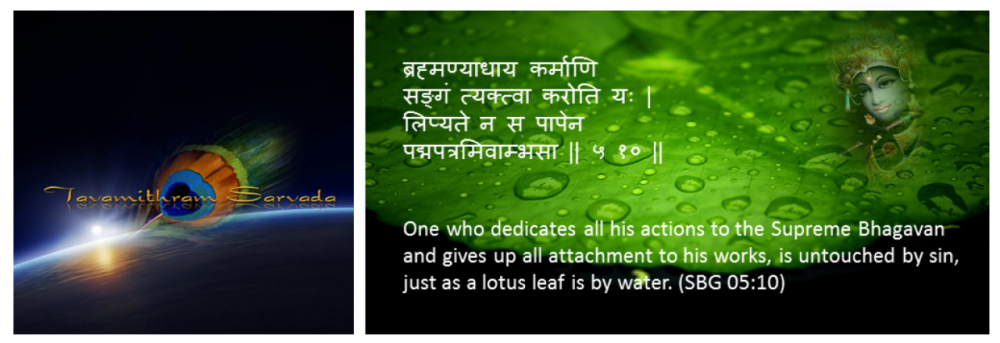The musk deer is, in fact, the perfect example of the tendency of most people to spend their whole life looking for God when the Self in them is that God that they are looking for. The ultimate goal of the study of Advaita Vedanta for a seeker, is to learn to realise their true Self which is pure Divinity.
Bhagavan Krishna says in the Srimad Bhagavad Gita:
SBG 6:31 He who is in union with Me and worships Me residing in all beings, becomes a Yogi and, whatever circumstances he may be in, resides in Me.
SBG 10:20 I am the Self, O Arjuna, situated within all living entities. I am the origin, the middle and also the end of all beings.
SBG 13:02 You should know that the Kshetrajna or the embodied Self in all bodies or Kshetras is Me, O Arjuna. Knowing about the Kshetra and the Kshetrajnas is called knowledge.
SBG13:27 The person who truly sees is the one who sees the Supreme Bhagavan, existing equally, the unperishing within the perishing.
The Mandukya Upanishad, which is the shortest Upanishad with merely 12 verses, analyses the syllable ‘AUM’ and explains through it the four states of consciousness. Watch the video on the Mandukya Upanishad below.
May you realise the divinity in you and understand that as in organised cults, the Advaita Vedanta does not propound the concept of a god being a separate being living somewhere up above. It is unfortunate that the lack of this vital knowledge drives people into confusion, mental delusion, mental slavery of soul merchants and kicks them out of the right course towards the Supreme Goal of creating great positive Karma and attaining Superconsciousness.
The Advaita Vedanta is the ultimate philosophy, understanding which, can straightaway lead you to eternal bliss.
Jai Shri Krishna


Vedhika,
Please go through this post ‘Focus and Devotion’ and let me know if you have any further questions https://tavamithramsarvada.wordpress.com/2018/08/26/focus-and-devotion/
Jai Shri Krishna
LikeLike
Hello Vedhika.
The Sanatana Dharma is no organised religion with commandments that its followers are expected to obey. One is not expected to believe in anything or anyone. Everyone is free to seek the ultimate truth in a way that suits them.
The core principle of the Advaita Vedanta is that God IS NOT A SEPARATE ENTITY.
Take Shloka SBG 10:20 “I am the Self, O Arjuna, situated within all living entities. I am the origin, the middle and also the end of all beings.”
The term Advaita literally means “NO TWO” It is also called nondualism in English. So what does this term mean? “No two” of what? Or rather, what is “NOT TWO”? It means nothing is TWO and that everything is ONE.
SBG 11:07 “Now see that the whole universe including the moving and the non-moving in my Universal Form all at once. You can see whatever you wish to see and also what you may wish to see in the future, O Gudakesha.”
In order to get to the tenth floor of a building even if you take the elevator, you will need to first get past the basement, the ground floor and all the floors that lay in between. It is the same case with people who would like to learn Advaita Vedanta. In order to identify and understand who the SELF in a person is, it is necessary to go through all the steps of worship. Bhakti or devotion develops into Gnyana or Knowledge.
Therefore, if people find bliss in visiting temples, they may very well do so, although it is not necessary. The most important things one should avoid is to go to a temple with the intention of making a deal with the deity. I hope you read my post “Spiritual Corruption, Corruption in Spirituality and Trade-Offs with Gods” https://tavamithramsarvada.wordpress.com/2019/02/02/corruption-in-spirituality/
The body, which is one’s personal house of divinity, is the greatest temple that a Jivatman resides in during a Janma or lifetime and hence it is most important to respect this temple and care for it before undertaking any kind of penances in preparation to go to a temple.
SBG 13:02 – (Bhagavan Krishna said) “You should know that the Kshetrajna or the embodied Self in all bodies or Kshetras is Me, O Arjuna. Knowing about the Kshetra and the Kshetrajnas is called knowledge.”
Jai Shri Krishna
LikeLike
Namaste dear Sir,
I thank you for explaining so clearly. Can you plz also give me the significance of saying Ganesh shlok before all religious ceremonis? Even you said Shri Ganesh namah in the start of the Gita audio book. I am having a discussion about this subject with my mil also so I would like to have more knowledge before talking to her.
Sincere thanks and affectionate regards,
Vedhika
LikeLike
Namaste dear Sir,
Now after listening to the full Gita I can understand the Mandukya Upanishad so much better. It is a completely different level sir.
I have a simple doubt sir. What about going to temples to pray? Is it not needed? What about people who take up rigorous fasts and difficult journeys to go to some temples? For eg: my mother in law goes through strict upvas before she goes to Vaishno Devi temple. I request you to clarify.
Sincere and affectionate regards,
Vedhika
LikeLike